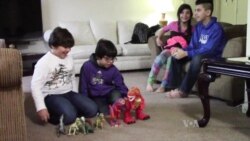"In the beginning, the war wasn’t near our city, but it kept moving from city to city and getting closer to us," said Waed Alhamoud, reflecting on what drove her family to seek out a new life halfway across the world.
"We felt we couldn't take it anymore," she told VOA. "That’s when we realized we needed to travel."
That was the beginning of a journey that began in the spring of 2011, when Syria became embroiled in an uprising that culminated in civil war.
Since then, more than half of Syria’s 11 million people have either been killed or fled in search of refuge, sometimes in nearby countries, and sometimes farther west in Europe or the United States.
But for most refugees, getting away from the violence that engulfed their home is only the beginning of a lengthy journey filled with uncertainty, danger, and even death.
Since the civil war began, the U.S. has only allowed 1,500 Syrians to resettle within its borders, and Alhamoud's family is one of the lucky few.
Entering their home, one is struck by how typically American is seems. The kids are on their tablets or doing homework as Alhamoud cooks in the kitchen. But scratch the surface and you'll hear a harrowing and tragically common tale of how they escaped civil war with only the clothes on their backs.
Searching for safety
Waed Alhamoud’s husband, Fadi Lababidi, owned a small business. When the war began, he realized his family needed to move. His work allowed him to travel to Jordan, where he was able to find a temporary safe haven for them.
But initially, it meant leaving his family behind in Syria, and getting them out of the country proved difficult. After repeatedly being turned down by the authorities, Lababidi resorted to bribery to get his wife and children out of the country as well.
From Jordan, they watched as their home, Lababidi's business, and nearly everything in their city was turned to rubble.
They could never go back home again. As life for the thousands of Syrians fleeing into Jordan became more difficult, Lababidi applied to the UN for refugee status.
"My concern was to take my family anyplace good," he said.
Finding a new home, with help
What followed is typical for refugees: three years in limbo. During their last year in Jordan, the adults underwent a series of six interviews, each lasting five hours. Then the call came. Exodus Refugee Immigration would help them move to Indianapolis, Indiana. They had just six days to prepare, and knew little English.
Sara Hindi, then an intern with the social service group, met them at the Indianapolis airport to act as their interpreter. She ultimately became the family's mentor.
"I kind of took on the opportunity to be a friend for them, to be a family member for them," she said. Hindi "knew what life was like being Arab and Muslim in the United States."
The kids quickly picked up English, happy to be back in school. Lababidi got a job. And for the most part the community was helpful and welcoming.
Terror attack backlash
Then came November’s terror attacks in France. In response, governors of more than half of the states, including Indiana, signed a petition to stop Syrian refugees from resettling in the United States.
Lababidi says he understands the governors’ fear and need to keep their people safe, but says terror comes from everywhere and that it's wrong to single out and punish Syrian refugees.
"This problem in Syria, not just from Syrian people," he said. Terror comes "from every country, from Iran, from Iraq, from America, from Europe, from Lebanon, from Jordan, from every people."
For their part, the family has made it their mission to counter the widespread perception of a link between Syrian refugees and terrorism. They've extended an invitation to anyone to come to their home for a cup of Ahlamoud’s deliciously rich Arabian coffee, to hear their story, and learn first hand that terror and Islam do not go together.
"People who commit all these horrible acts in the name of Islam, don’t know Islam at all. Islam does not order killing," Lababidi stressed. "Those people don’t represent Muslims at all."
The family hopes that someday even Indiana Governor Mike Pence will visit their home to see they truly are like any other American family: kids on their smart phones, Mom in the kitchen, Dad working hard. They’ve just been through a little more to find their American dream.





